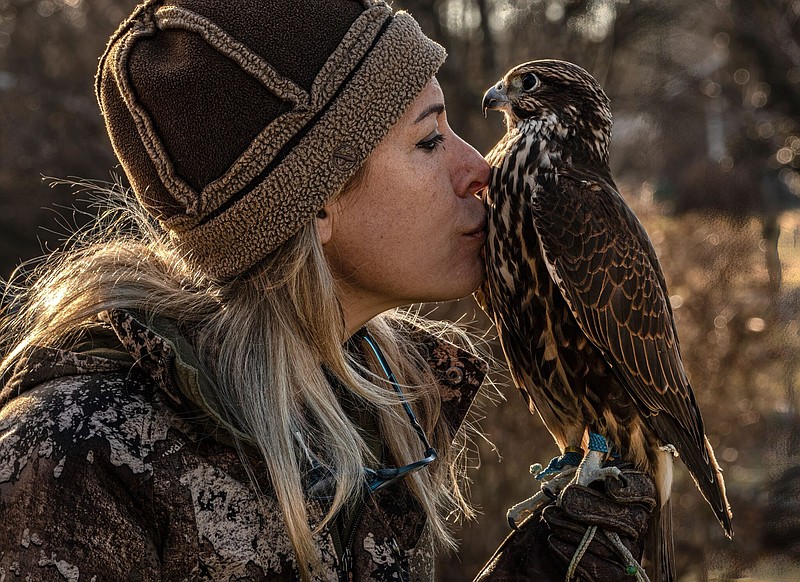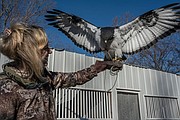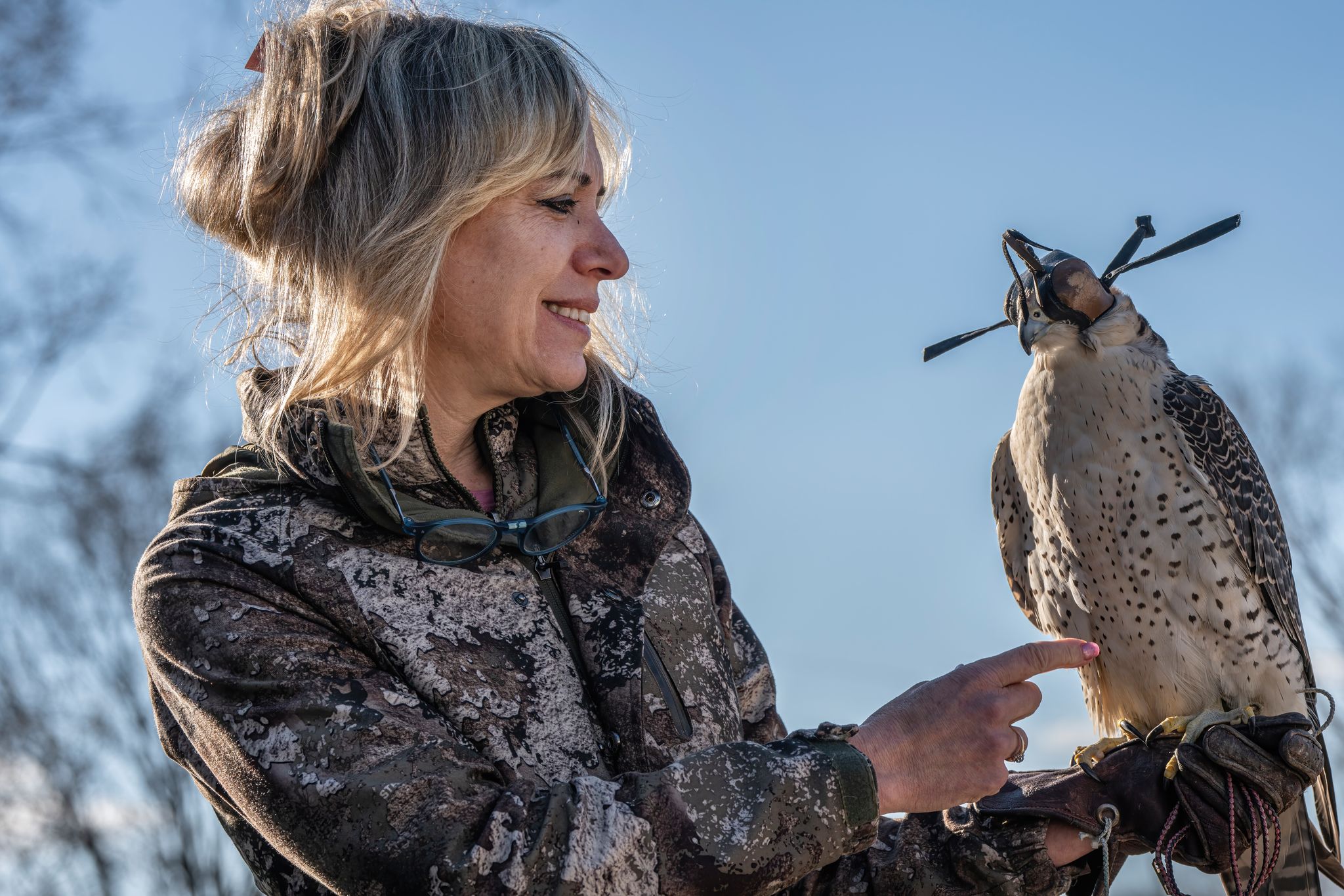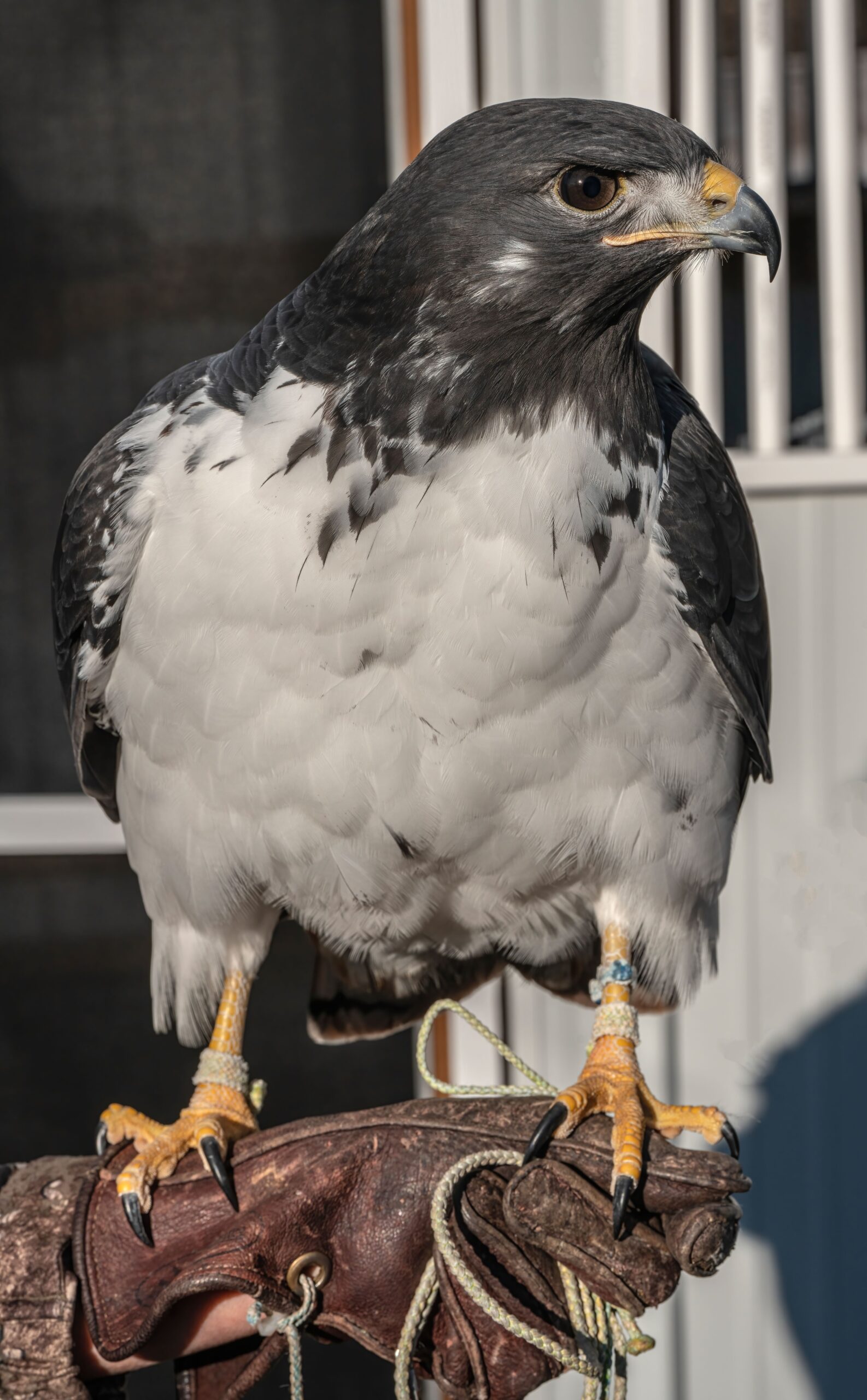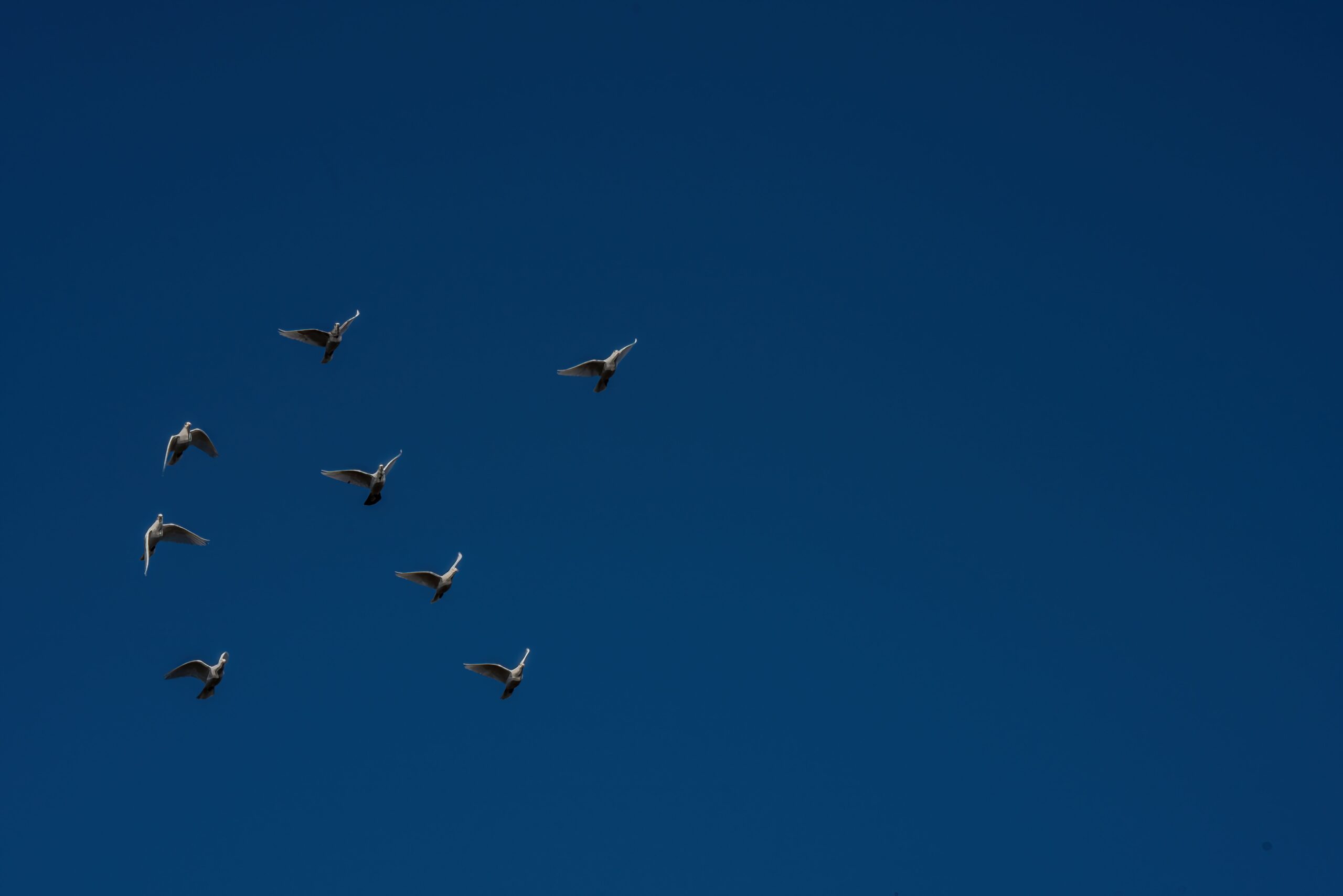Holly Lamar, a master falconer and owner of a Nashville "bird experience" business, has a story to tell about each one of her 13 captive-bred birds of prey.
The story behind Faith, her 7-year-old peregrine falcon, is tied to a particularly rough patch for Lamar, who experienced success as a Grammy-nominated songwriter then lost nearly everything. The 20-day-old chick arrived just after Lamar fell victim to a financial scam that wiped out earnings from her music career.
She picked the name "Faith" to symbolize the feelings of trust she was trying to regain in her life -- and as a nod to Faith Hill, the country singer who recorded "Breathe," a 1999 megahit co-written by Lamar.
Faith, the falcon, is now dead -- one of 13 birds seized by officers with the Tennessee Wildlife Resources Agency in a sweeping August search of Lamar's home and property that a Nashville judge later called egregious, an abuse of the law and a violation of Lamar's constitutional rights.
TWRA obtained the search warrant days after Lamar filed a complaint against an agency employee in charge of enforcing raptor regulations. The employee, Lamar told the Lookout, had given her conflicting information about state raptor permit rules and failed to respond entirely to other questions for months.
Lamar would not learn of the 30 misdemeanor charges against her for three months -- after her birds, cellphone, computer, photography equipment, office files, compact discs and other possessions were taken from her suburban home in Nashville's White House neighborhood, effectively shutting down her bird education business.
It wasn't until January -- five months after Lamar's birds and possessions had been taken from her -- that Davidson County General Sessions Judge Lynda Jones ordered their immediate return, dismissing the warrants and issuing a blistering commentary from the bench.
"I feel that the defendant's Constitutional rights have been violated in (an) egregious manner," Jones said during the Jan. 6 hearing, according to a transcript of the proceedings.
"For the state to come in, in August, after a complaint has been rendered about an employee and ask for a search warrant is an overreach of the government," Jones said. "Going in and taking someone's property that's not justified and then holding it for two months and bringing criminal charges later is an abuse of the law.
"The state is further concerned about potential for malicious prosecution," the judge said.
(READ MORE: Tennessee plans to turn old-growth forest into quail savanna ruffle feathers)
Lamar's confiscated birds -- among them a Harris hawk, an aplomado falcon, a hybrid Barbary falcon, an American kestrel, a Eurasian eagle owl, an augur buzzard, two saker falcons and a barn owl -- have since been returned, but of her two peregrine falcons, only Levi survived his five months in a TWRA-contracted facility under conditions Lamar called wholly unsuitable. At times Faith was kept in a dog crate, covered with a blanket. Lamar keeps birds in large outdoor sheds, with sunlight and room to fly.
Lamar said she is heartbroken at the loss of Faith, who died over the Christmas holiday. She is also struggling financially in the aftermath of bird education business losses she incurred, while spending tens of thousands of dollars on her legal defense.
"This could have been stopped multiple times before my bird died," Lamar said last week. "I kept her alive for seven years across three continents. TWRA couldn't keep her alive for four months."
Ben Raybin, Lamar's attorney, said TWRA's seizure of Lamar's birds and the criminal charges brought against her "never should have happened." The search warrants had nothing to do with the well-being of the birds in Lamar's care, instead alleging "mere regulatory violations," he said.
"The entire ordeal was an injustice to Holly and her birds that exposes significant problems within the TWRA and its regulations considering the judge's finding that her constitutional rights were violated and the TWRA's statement that approval occurred at high levels," Raybin said in a statement.
Last month, the Davidson County District Attorney's Office withdrew all charges against Lamar.
"After evaluating the judge's ruling, a decision by the office was made not to continue the case," said Ken Whitehouse, a spokesperson for the DA.
Capt. Rusty Boles, the TWRA officer against whom Lamar filed the complaint, was unavailable for an interview, an agency spokesperson said.
TWRA officials "followed proper protocol" in Lamar's case, said Emily Buck, the spokesperson. That included getting initial approval to seek warrants by a district captain and a regional major, before obtaining the district attorney's approval, she said.
"TWRA is committed to continuously evolving policy and regulations to improve law enforcement procedure and the conservation of birds of prey and other wildlife species," Buck said. "We make every effort to educate the public about proper care and handling, but the agency is tasked with pursuing enforcement when violations persist after education efforts fail."
PUZZLE PIECES
In February 2022, Lamar first encountered Boles, a TWRA wildlife officer since 2001 who had recently taken on responsibilities for raptor regulation after a longtime colleague retired.
Falconry is the practice of using trained raptors -- among them eagles, hawks, falcons and owls -- for hunting wild game. Specifically, Tennessee law defines it as "the sport of taking quarry by means of a trained raptor."
The birds can be legally owned for other purposes, too, including education, breeding and abatement -- the use of raptors to deter human-wildlife conflicts, such as seagulls disrupting airport operations.
How the raptors are used -- for sport, breeding or abatement -- and whether they are exotic or native, wild-caught or captive-bred are subject to an array of state and federal regulations Lamar was seeking to navigate.
Jones, the judge, characterized the laws as "very ambiguous, vague, a lot of puzzle pieces that don't properly fit together."
(READ MORE: Tennessee wildlife agency sued over secret surveillance on private land)
A state permit limits the number of raptors for use in falconry to five. The permit application alludes to the state's definition of falconry, asking -- for example: "how many years of active falconry (hunting quarry)" the applicant has. Additionally, TWRA regulates only wildlife native to Tennessee.
But Lamar said she wasn't using all her raptors for hunting, and just four of Lamar's birds are native to Tennessee.
Lamar has a master falconry permit from the state, along with federal permits allowing her to possess an unlimited number of raptors for education, breeding and abatement. She was seeking information from Boles about any additional state permits she required.
Lamar uses birds for breeding and education, and she hoped to get state approval for abatement. One of the jobs she has had to forgo was to control an enormous influx of blue starlings at the Nashville Symphony.
For months, Lamar said, she sought answers from Boles on what other types of state permits she was required to obtain.
Boles' either failed to provide answers or, when he did respond to Lamar, gave responses that were " widely divergent from that of his predecessor and decades of previous TWRA interpretation," according to a motion filed by Lamar's attorney.
Boles took the position that anyone with a falconry permit was limited to five raptors, regardless of whether they were also in possession of birds for other purposes. It was a position not taken by any other state wildlife agency, according to two national raptor organizations that intervened in support of Lamar in the criminal case against her.
Laura Hazelett, president of the American Falconry Association, said she unsuccessfully sought to share that information with Boles before Lamar's birds were seized. TWRA's enforcement action, Hazelett said in an interview, has unsettled the greater U.S. falconry community, a group that consists of 4,000-6,000 people who practice the ancient art of using raptors to hunt quarry, raise birds of prey for education and breed them.
A friend-of-the-court brief submitted by the North American Falconer's Association said state permits limiting the number of birds used for falconry are not intended to apply to raptors used for other purposes.
The 2,000-member organization, which helped craft federal falconry regulations, called the TWRA's efforts to prosecute Lamar unprecedented in the modern history of U.S. falconry and a misapplication of the law.
"We are unaware of something of this nature happening to any of our other members in recent history," their legal brief said. "If it stands, this misinterpretation of law in Tennessee will set a precedent that will have a chilling effect on the relationship between falconers and TWRA officials."
GRAY AREAS
In audio recordings of lengthy phone calls that took place between Boles and Lamar over a period of months before she filed a complaint, Boles acknowledged the laws had a lot of gray areas.
When Lamar asked where she could find all the laws that applied to her birds, Boles responded, "You will never be able to find them," according to audio of a phone conversation on June 21 of last year reviewed by the Lookout.
"If I can't find them, how can I be held accountable if I don't know about them?" Lamar asked.
"This is the same talk we've had over and over again. That's what is so frustrating, Holly. It's the same stuff, I keep saying," Boles replied. "Just be patient."
Lamar said the conversations, over a period of months, inevitably ended with Boles telling her to "hold on" about the permits she had to get to be compliant with Tennessee law. In the meantime, Lamar's business, which included bringing groups to her property to teach them about the birds and conservation, was stalled.
"I've told you 100 times that I've got to get everything straightened out, and make it to where everybody is doing what they are supposed to be doing," Boles told her during the same conversation. "I'm going to tell you, all these other falconers around here that are doing the same stuff, they are on my radar, too."
(READ MORE: After controversy, shakeup at Tennessee Wildlife Resources Agency)
Lamar said she grew increasingly fearful of what enforcement actions Boles might try to undertake, she said.
COMPLAINT FILED
On July 25, 2022 Lamar sent a lengthy email of complaint to Boles, cc'ing TWRA's oversight body, the secretary for then TWRA Executive Director Bobby Wilson and the complaint email inbox. She requested a meeting with the agency's general counsel and executive director to go over the rules. She didn't get a response.
Just more than a week later, TWRA obtained a search warrant for Lamar's property, including her home, her phone, her vehicle and her computer. The warrant claimed Lamar exceeded the state limit of five raptors and alleged she had failed to complete required notice to the state for the purchase of a barn owl.
The charges that followed -- 30 misdemeanors -- would not be filed until October. Lamar was in the dark about the whereabouts of her birds, many hand-raised by Lamar as chicks, and unaccustomed to other human interaction. The delay in filing charges meant Lamar "had no recourse under Tennessee law to challenge the search warrant or seek return of her birds," said Raybin, Lamar's attorney.
Boles conceded in court that he did not consult TWRA counsel before pursuing the warrant and had never received training in how to interpret state law.
The decision to pursue a search warrant, and later charges, against Lamar was not Boles' decision alone, according to the TWRA. It was done with the approval of a TWRA regional major, and in "consultation and approval from the District Attorney's Office, including the decision to seize all 13 birds."
Buck, the TWRA spokesperson, said the TWRA has reviewed the case and determined Boles was not at fault.
Boles, she said, informed Lamar she was "not in compliance with Tennessee falconry rules and provided her with guidance and recommendations for how to come into compliance."
Buck, in a statement, also said numerous reporting violations had occurred and that Lamar was "one bird over the legal limit for falconry use" -- a statement at odds with search warrants and other filings in the case that accused Lamar, who owned 13 raptors, of being eight birds over the limit.
The legal decisions within TWRA are being questioned by the North American Falconers Association, which questioned the legal competence of TWRA enforcement officials. While state regulations for falconry, breeding and possessing raptors vary, it is common across the country for master falconers to possess birds for multiple purposes.
"If a community that is subject to the oversight of a regulatory agency cannot depend on the legal competence of the agency, and reasonable conduct of its functions, the public interest in fair and efficient governance and law enforcement is subverted," the association's legal filing said.
Buck said last week the TWRA will be considering input from falconer's groups on future rule language.
"BITTERSWEET"
Lamar has her raptors home, where they sit in large enclosures in the back of her home.
She said the end of the court case against her is "bittersweet because of Faith." The falcon is undergoing a necropsy at the University of Tennessee to determine its cause of death and "appropriate corrective actions will be taken if warranted," Buck, TWRA's spokesperson, said.
Buck noted that old age was a potential contributing factor in the bird's death and that the average lifespan for such birds is five to seven years.
Lamar called that "misleading at best." The average lifespan of five to seven years applies only to birds in the wild, she said, but captive peregrine falcons can live up to 20 years.
Lamar is uncertain what happens next, given TWRA's continued statements defending the legal action against her.
"It's also bittersweet because they may still be willing to take my falconry license," she said. "I feel like I am a prime target for TWRA because they know they mistreated me and my birds and violated my constitutional rights."
Falconry is the practice of using trained raptors for hunting wild game, but the birds can also be legally owned for breeding, education and deterrence of human-wildlife contact.
Read more at TennesseeLookout.com.
